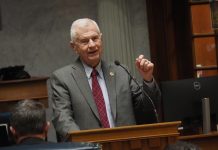National Groups Pour Money Into 2020 Indiana Attorney General Race
By Erica IrishÂ
TheStatehouseFile.comÂ
INDIANAPOLIS —Two national associations are funneling hundreds of thousands to Indiana’s attorney general candidates, an office that’s been increasingly politicized over the last several years.
The Republican Attorneys General Association, or RAGA, follows a simple mission on its surface: The Washington, D.C.-based organization is committed to electing Republican attorneys general across the United States while preventing successful campaigns by Democratic opponents for the office. The Democratic Attorneys General Association has a similar mission—elect Democrats to the top legal position at the state level.

When Indiana Democrats nominated former Evansville Mayor Jonathan Weinzapfel for attorney general in June, for instance, RAGA swiftly released a statement. It painted Weinzapfel as a “lawless liberal,†who put “boondoggles over badges†and “Hillary,†as in Hillary Clinton, over Hoosiers.
“Newly minted Democrat nominee for attorney general, lawless liberal Jonathan Weinzapfel, does not support the strong Hoosier values of family, safety, and economic security,†the statement read.
As sexual battery allegations against incumbent Attorney General Curtis Hill unfolded, RAGA named him vice-chairman. Campaign finance records show the organization contributed almost $1.5 million to his successful 2016 election — amounting to about half the money he spent overall.
And while Hill narrowly lost his re-election bid to former U.S. Rep. and Republican candidate Todd Rokita, RAGA continues to play a central role. The group has donated close to $796,000 to Rokita to date, more than half of his contributions.
Weinzapfel, too, accepted some $300,000 in direct contributions from DAGA and another $50,000 in in-kind donations.
RAGA and  DAGA for years operated under an agreement they would not attack incumbents of the opposite party. This also limited negative campaigning against candidates on the other side.
But that changed in 2017. Donald Trump had been elected president and his administration had begun to challenge regulations and laws created under Barack Obama, perhaps most notably the Affordable Care Act.

In a 15-8 vote, attorneys general who was part of RAGA voted to scrap the incumbency rule, according to reporting form Reuters. Those who supported the change, according to the report, argued similar national groups targeted incumbents, while those who voted against claimed the rule protected bipartisanship and that Republicans had managed to grow their ranks regardless.
RAGA doing away with its incumbency rule triggered a sharp increase in spending by both associations. While RAGA still far outspends, both groups have upped contributions to state races since 2016.
In 2018, the RAGA contributed some $50.9 million, double the $26.2 million it contributed in 2016. DAGA followed suit with a more modest increase, going from $16.7 million in contributions in 2016 to $20.5 million in 2018.
Both organizations operate political action committees, or PACs, and face very few regulations when it comes to what they can donate to campaigns. Nicholas Almendares, an associate professor of law at the Indiana University Maurer School of Law in Bloomington, said groups like this are basically unregulated under current federal law, although states can impose reasonable limitations on spending.
“The constitutional argument is that they’re just like me engaging in political speech,†Almendares said.
Prior to Curtis Hill, who entered office in 2016, RAGA held little influence in the Indiana attorney general’s office.
Former Indiana Attorney General Greg Zoeller, also a Republican, funded his campaigns primarily through Republican party chapters, local lobbyists, law firms and individual contributions, according to campaign finance documents.
This change signifies in many ways how being an attorney general today means more than managing malpractice and fraud suits in a state. It’s now a chief political tool in an era of new division.
In 2018, for example, Hill added Indiana’s name to a multi-state lawsuit to overturn the Affordable Care Act. That lawsuit is now under review by the U.S. Supreme Court, which now has a vacancy following the death of Justice Ruth Bader Ginsburg in October. President Trump has since nominated Amy Coney Barrett, a circuit judge on the U.S. Court of Appeals for the Seventh Circuit, to replace Ginsburg.
Almendares said it’s incentives like this that encourage more national actors like RAGA and DAGA to take interest in local races they might not otherwise care about.
“The answer is, they really care about it,†Almendares said. “Attorneys general are making a lot of policy…they’re active in the national stage. And I think that’s something that’s certainly much more common now.â€
FOOTNOTE: Erica Irish is the 2020 Russell Pulliam editor for TheStatehouseFile.com, a news website powered by Franklin College journalism students.Â




